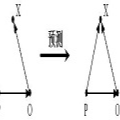Link prediction problem has increasingly become prominent in many domains such as social network analyses, bioinformatics experiments, transportation networks, criminal investigations and so forth. A variety of techniques has been developed for link prediction problem, categorized into 1) similarity based approaches which study a set of features to extract similar nodes; 2) learning based approaches which extract patterns from the input data; 3) probabilistic statistical approaches which optimize a set of parameters to establish a model which can best compute formation probability. However, existing literatures lack approaches which utilize strength of each approach by integrating them to achieve a much more productive one. To tackle the link prediction problem, we propose an approach based on the combination of first and second group methods; the existing studied works use just one of these categories. Our two-phase developed method firstly determines new features related to the position and dynamic behavior of nodes, which enforce the approach more efficiency compared to approaches using mere measures. Then, a subspace clustering algorithm is applied to group social objects based on the computed similarity measures which differentiate the strength of clusters; basically, the usage of local and global indices and the clustering information plays an imperative role in our link prediction process. Some extensive experiments held on real datasets including Facebook, Brightkite and HepTh indicate good performances of our proposal method. Besides, we have experimentally verified our approach with some previous techniques in the area to prove the supremacy of ours.
翻译:暂无翻译




